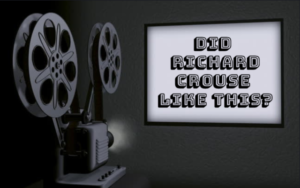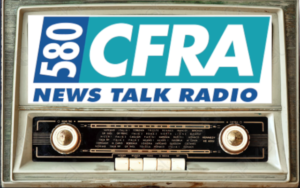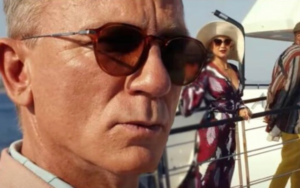CTV NEWSCHANEL: Janelle Monáe ON MURDER MYSTERIES AND “GLASS ONION.”
 I speak with “Glass Onion” star Janelle Monáe about working with Daniel Craig, playing murder mystery games with the film’s cast and more.
I speak with “Glass Onion” star Janelle Monáe about working with Daniel Craig, playing murder mystery games with the film’s cast and more.
Watch the whole thing HERE!
 I speak with “Glass Onion” star Janelle Monáe about working with Daniel Craig, playing murder mystery games with the film’s cast and more.
I speak with “Glass Onion” star Janelle Monáe about working with Daniel Craig, playing murder mystery games with the film’s cast and more.
Watch the whole thing HERE!
 Watch as I review three movies in less time than it takes to kick a football! Have a look as I race against the clock to tell you about Benoit Blanc in “Glass Onion,” the sports drama “The Swimmers” and the animated “Strange World.”
Watch as I review three movies in less time than it takes to kick a football! Have a look as I race against the clock to tell you about Benoit Blanc in “Glass Onion,” the sports drama “The Swimmers” and the animated “Strange World.”
Watch the whole thing HERE!
 I appear on “CTV News at 6” with anchor Andria Case to talk about the best movies and television to watch this weekend. This week I have a look at the latest mystery from Benoit Blanc, “Glass Onion” and the animated “Strange World.”
I appear on “CTV News at 6” with anchor Andria Case to talk about the best movies and television to watch this weekend. This week I have a look at the latest mystery from Benoit Blanc, “Glass Onion” and the animated “Strange World.”
Watch the whole thing HERE! (Starts at 36:27)
 I join NewsTalk 1010 host Jim Richards on the coast-to-coast-to-coast late night “NewsTalk Tonight” to play the game “Did Richard Crouse Like This?” This week we talk about the latest mystery from Benoit Blanc, “Glass Onion,” the sports drama “The Swimmers” and the animated “Strange World.”
I join NewsTalk 1010 host Jim Richards on the coast-to-coast-to-coast late night “NewsTalk Tonight” to play the game “Did Richard Crouse Like This?” This week we talk about the latest mystery from Benoit Blanc, “Glass Onion,” the sports drama “The Swimmers” and the animated “Strange World.”
Listen to the whole thing HERE!
 I join CTV NewsChannel anchor Akshay Tandon to talk about the latest mystery from Benoit Blanc, “Glass Onion,” the sports drama “The Swimmers” and the animated “Strange World.”
I join CTV NewsChannel anchor Akshay Tandon to talk about the latest mystery from Benoit Blanc, “Glass Onion,” the sports drama “The Swimmers” and the animated “Strange World.”
Watch the whole thing HERE!
 I sit in with CKTB morning show host Tim Denis to discuss the weekend’s flickers including the latest mystery from Benoit Blanc, “Glass Onion,” the sports drama “The Swimmers” and the animated “Strange World.”
I sit in with CKTB morning show host Tim Denis to discuss the weekend’s flickers including the latest mystery from Benoit Blanc, “Glass Onion,” the sports drama “The Swimmers” and the animated “Strange World.”
Listen to the whole thing HERE!
 I sit in on the CFRA Ottawa morning show with host Bill Carroll to talk the new movies coming to theatres including the latest mystery from Benoit Blanc, “Glass Onion,” the sports drama “The Swimmers” and the animated “Strange World.”
I sit in on the CFRA Ottawa morning show with host Bill Carroll to talk the new movies coming to theatres including the latest mystery from Benoit Blanc, “Glass Onion,” the sports drama “The Swimmers” and the animated “Strange World.”
Listen to the whole thing HERE!
 “Glass Onion: A Knives Out Mystery,” the sequel to the popular Daniel Craig detective movie “Knives Out, now playing in theatres before moving to Netflix in late December, is a satire of old school Agatha Christie with a modern sensibility.
“Glass Onion: A Knives Out Mystery,” the sequel to the popular Daniel Craig detective movie “Knives Out, now playing in theatres before moving to Netflix in late December, is a satire of old school Agatha Christie with a modern sensibility.
Craig returns as detective Benoit Blanc, “The Last of the Gentlemen Sleuths.” He’s the American Poirot, with a honied Southern accent and a Jessica Fletcher-esque knack for being present when people are murdered.
In the new film he finds himself, post COVID lockdown, at a lavish private estate on a Greek island owned by billionaire Miles Bron (Edward Norton doing Elon Musk). Invited by a mysterious third party, it is just the tonic he needs to shake his post COVID lockdown blues.
“I lose it between cases,” he drawls. “I may be going insane. My brain is a fuelled up sportscar, with nowhere to go. I need a great case.”
Bron has invited “my dear disrupters, my closest inner circle,” like former business partner Andi Brand (Janelle Monáe), scientist Lionel Toussaint (Leslie Odom Jr.), man’s rights YouTube star Duke Cody (Dave Bautista), fashion designer and unapologetic loudmouth Birdie Jay (Kate Hudson) and politician Claire Debella (Kathryn Hahn) among other glamourous types, to play a very special game.
“I’ve invited you all to my island,” says Bron, “because tonight, a murder will be committed. My murder.”
With clues hidden all over the island, Bron encourages his guests to “closely observe each other. If anyone can name the killer, that person wins our game.”
It’s all fun and games until a real dead body shows up and everyone on the island is a suspect in the crime.
“Ladies and gentlemen,” says Blanc. “You expected a mystery. You expected a puzzle. But for at least one person on this island, this is not a game.”
Cue the whodunnit. The characters are all connected, and all have a motive for murder. “This is a case that has confounded me like no other,” Blanc says as he peels back the layers of the mystery.
There is a lot of talk of disrupters in “Glass Onion.” Each of the guests have caused radical change in their industries, a fact pointed out by Bron as the reason they are all friends. It also applies to writer/director Rian Johnson. He pays homage to a well-worn format, the Agatha Christie ensemble cast and elaborate crime reveal, but breathes new life into the tried-and-true format, updating and disrupting the structure.
Johnson uses all the same stylistic—flourishes, flashbacks, red herrings and diversionary tactics—as Christie did, in books and on screen, but adds a spark, juggling the story’s twists, turns and reveals with great aplomb and humour. The result is a swiftly paced thriller that is equal parts silly and suave.
It’s become trendy to skewer the rich and ridiculous in film. Recent movies like “Triangle of Sadness” and “The Menu” lay waste to entitlement and privilege, and “Glass Onion” is no different. Bron and his crew of influencers and desperadoes are presented as self-serving, uncaring and absurd—“What is reality?” shrieks Birdie Jay when the going gets rough—providing a juicy blast of raucous moral ambiguity as an undercurrent to the murder mystery.
As a sequel that improves on the original, “Glass Onion: A Knives Out Mystery,” is a rarity. It may follow a template formatted by Agatha Christie, but like the titular “Glass Onion” itself, Johnson is transparent in his desire to make the mystery deeper, the characters more extreme and the thrills more thrilling. As Blanc says in the in the film, “This is truly delightful.”
 Watch Richard Crouse review three movies in less time than it takes to try on a new shade of lipstick! Have a look as he races against the clock to tell you about the animated “Hotel Transylvania: Transformania,” the home invasion flick “See for Me” and the post-apocalyptic “Mother/Android.”
Watch Richard Crouse review three movies in less time than it takes to try on a new shade of lipstick! Have a look as he races against the clock to tell you about the animated “Hotel Transylvania: Transformania,” the home invasion flick “See for Me” and the post-apocalyptic “Mother/Android.”
Watch the whole thing HERE!